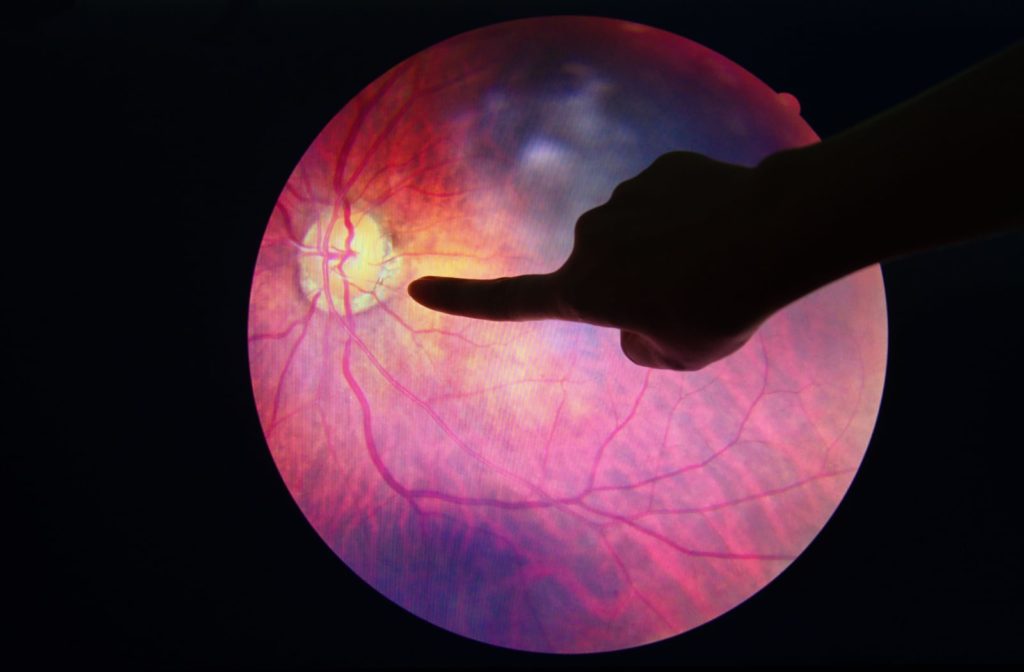Eye exams are essential for protecting your eye health and vision, especially if you have diabetes. Patients with diabetes need more frequent eye exams with a focus on their eye health, known as diabetic eye exams.
These eye exams are vital for managing diabetes effectively, but what is a diabetic eye exam, and why might someone need one?
What Is a Diabetic Eye Exam?
A diabetic eye exam is a comprehensive eye exam that patients with diabetes receive. These eye exams are similar to a standard examination, but your eye doctor pays extra attention to the internal structures of your eye.
Each diabetic eye exam includes a detailed look at your eyes, known as an eye health evaluation. Your eye doctor looks at your retina, macula, optic nerve, cornea, and other parts of the eye to evaluate your eye health and identify potential eye diseases.
According to the Canadian Association of Optometrists, Canadians aged 19–64 should have an eye exam at least every 2 years. If you have diabetes, you should have an eye exam annually.
Your optometrist needs to complete a detailed eye exam because diabetes increases your risk of eye problems.
Why Does Someone with Diabetes Need a Special Eye Exam?
Diabetes affects how the body uses insulin, a hormone that controls your blood sugar. Your body either doesn’t make enough insulin or can’t use it efficiently. When your body doesn’t use insulin properly, it leads to uncontrolled blood sugar.
High blood sugar causes complications in the retina, a part of your eye essential for vision. Blood vessels in the retina become damaged, leading to vision problems.
What Happens During a Diabetic Eye Exam?
Your diabetic eye exam includes several diagnostic tests, including:
- Vision assessment
- Eye pressure measurement
- Dilated eye health evaluation looking for internal anomalies:
- Diabetic retinopathy – with or without macular edema
- Cataracts
- Optic nerve damage
Checking inside the eye is essential for diagnosing eye diseases as early as possible. Many eye conditions can develop with limited symptoms, making them difficult to notice on your own. You may not know you have an eye problem until you experience vision-related complications.
Looking at the eye can help identify small changes to the eye’s internal structures. To see the eye in detail, your optometrist will prefer using several diagnostic technologies, including:
With your eye doctor’s help, you can diagnose and treat diabetic eye disease, protecting your vision.
Diabetic Eye Disease
Diabetic eye disease is an umbrella term for eye problems that develop due to diabetes. Your risk for these conditions is higher, making it important to receive regular eye exams. Your optometrist can help track changes to your vision and diagnose issues as early as possible.
Diabetic eye disease includes the following conditions:
Diabetic Retinopathy
Only someone with diabetes can develop diabetic retinopathy, a condition that can lead to severe vision loss. This disease occurs when high blood sugar damages the blood vessels in your retina. These vessels bulge and swell before breaking and leaking fluid and blood into the eye.
As this disease progresses, you may experience more complications, including scar tissue, further bleeding, or diabetic macular edema.
Diabetic Macular Edema
Diabetic macular edema is a complication of diabetic retinopathy, developing when leaking blood and fluid affects the macula. Fluid in the eye causes the macula to swell, causing vision problems.
If left untreated, diabetic macular edema can cause severe vision loss.
Glaucoma
Glaucoma is a group of eye diseases that damage your optic nerve. Damage to this essential part of the eye can lead to vision loss, making it important to identify glaucoma in its early stages. However, this disease can progress with limited symptoms until vision loss occurs.
Diabetes can increase your risk of glaucoma, making it important to book regular eye exams. Your optometrist can examine your eye to look for early signs of this condition.
Cataracts
A cataract occurs when your eye’s lens becomes cloudy and obstructs your vision. This condition is typically age-related, developing as you get older.
The proteins and fibres in the eye lens begin to clump together, creating the cloudy spots you see in your vision. With time, these cloudy areas progress until your vision worsens. Many people require cataract surgery to improve their vision.
Diabetes increases the risk of cataracts because high blood sugar can cause clouding in the eye’s lens.
Protect Your Vision & Eye Health
Diabetes can significantly affect your eye health, but your eye doctor is here to help. They can track changes to your eyes and vision to help protect your sight from diabetes-related complications. Remember to book an annual eye exam if you have diabetes.
Contact Downtown Eye Care & the Contact Lens Department when it’s time for your next eye exam.





